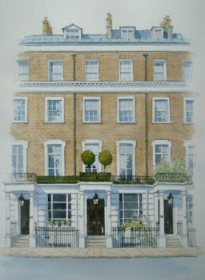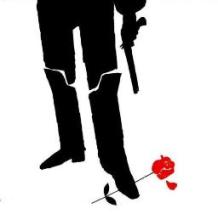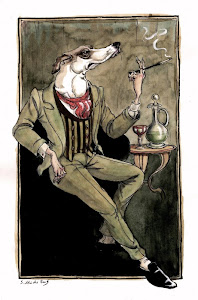 'I have chosen my colleague,' I said.
'I have chosen my colleague,' I said. 'Billy Arbuthnot's boy? His father was at Harrow with me. I know the fellow - Harry used to bring him down to fish - tallish, with a lean, high-boned face and a pair of brown eyes like a pretty girl's. I know his record, too. There's a good deal about him in this office. He rode through Yemen, which no white man ever did before. The Arabs let him pass, for they thought him stark mad and argued that the hand of Allah was heavy enough on him without their efforts. He's blood-brother to every kind of Albanian bandit. Also he used to take a hand in Turkish politics, and got a huge reputation. Some Englishman was once complaining to old Mahmoud Shevkat about the scarcity of statesmen in Western Europe, and Mahmoud broke in with, "Have you not the Honourable Arbuthnot?" You say he's in your battalion. I was wondering what had become of him, for we tried to get hold of him here, but he had left no address. Ludovick Arbuthnot - yes, that's the man. Buried deep in the commissioned ranks of the New Army? Well, we'll get him out pretty quick!'
* * *
I must spare a moment to introduce Sandy to the reader, for he cannot be allowed to slip into this tale by a side-door. If you will consult the Peerage you will find that to Edward Cospatrick, fifteenth Baron Clanroyden, there was born in the year 1882, as his second son, Ludovick Gustavus Arbuthnot, commonly called the Honourable, etc. The said son was educated at Eton and New College, Oxford, was a captain in the Tweeddale Yeomanry, and served for some years as honorary attache at various embassies. The Peerage will stop short at this point, but that is by no means the end of the story. For the rest you must consult very different authorities. Lean brown men from the ends of the earth may be seen on the London pavements now and then in creased clothes, walking with the light outland step, slinking into clubs as if they could not remember whether or not they belonged to them. From them you may get news of Sandy. Better still, you will hear of him at little forgotten fishing ports where the Albanian mountains dip to the Adriatic. If you struck a Mecca pilgrimage the odds are you would meet a dozen of Sandy's friends in it. In shepherds' huts in the Caucasus you will find bits of his cast-off clothing, for he has a knack of shedding garments as he goes. In the caravanserais of Bokhara and Samarkand he is known, and there are shikaris in the Pamirs who still speak of him round their fires. If you were going to visit Petrograd or Rome or Cairo it would be no use asking him for introductions; if he gave them, they would lead you into strange haunts. But if Fate compelled you to go to Llasa or Yarkand or Seistan he could map out your road for you and pass the word to potent friends. We call ourselves insular, but the truth is that we are the only race on earth that can produce men capable of getting inside the skin of remote peoples. Perhaps the Scots are better than the English, but we're all a thousand per cent better than anybody else. Sandy was the wandering Scot carried to the pitch of genius. In old days he would have led a crusade or discovered a new road to the Indies. Today he merely roamed as the spirit moved him, till the war swept him up and dumped him down in my battalion.
John Buchan, Greenmantle (1916)





















3 comments:
Anything by John Buchan is just the best!
And this (Greenmantle) is Buchan's best book, even better than 39 Steps although his autobiography and his last novel (Breakheart River) are right up there too.
I knew you must have read John Buchan...
It's hard to imagine a time in which it was possible for someone like him to be Governor General of my country.
Things have changed.
Post a Comment